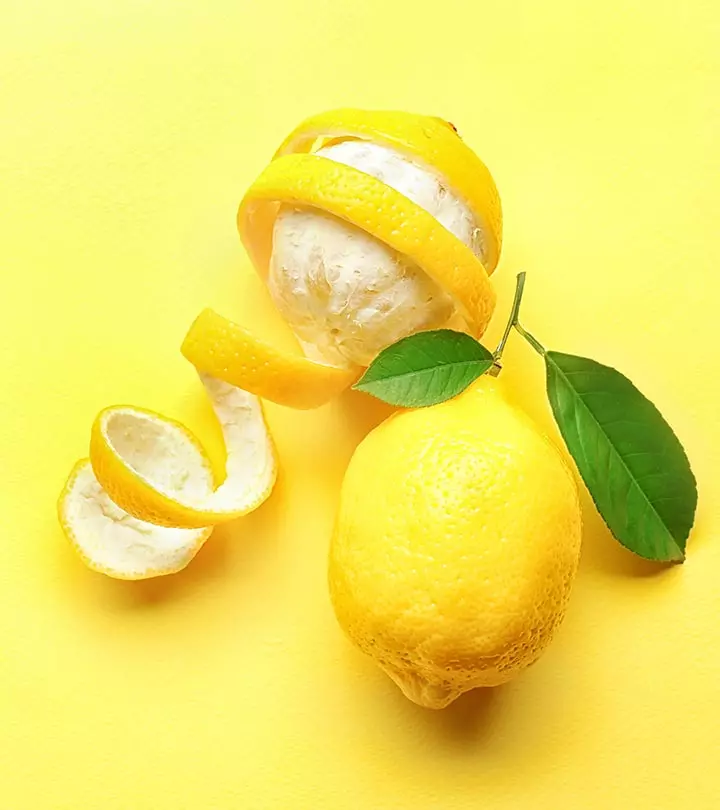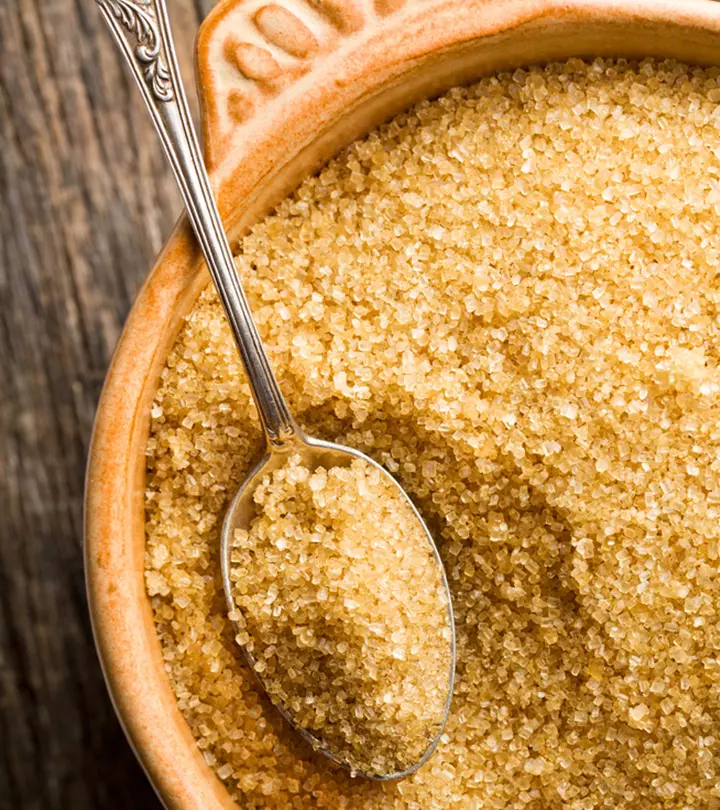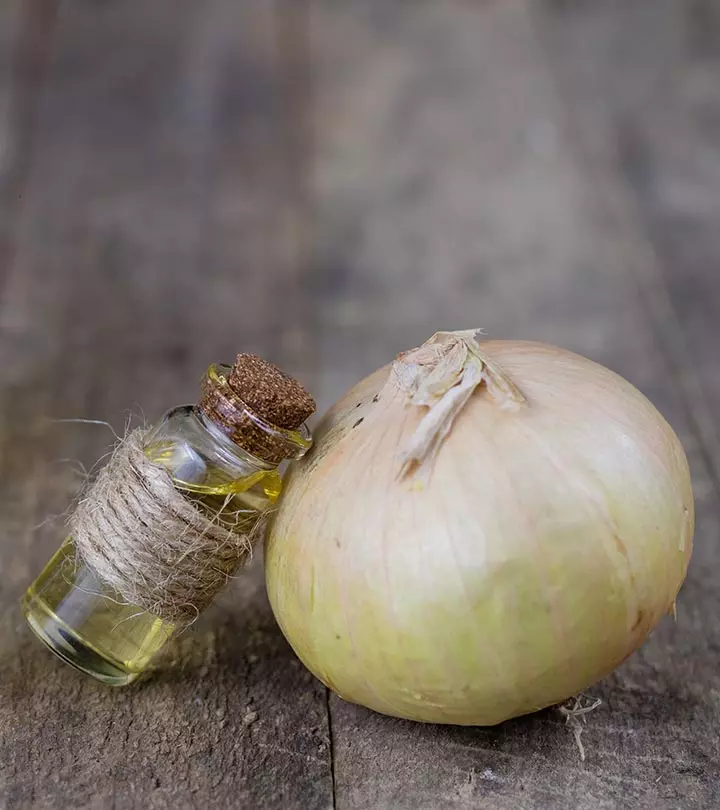Lemon Water Benefits, Nutrition, And How To Make It
Refreshing and hydrating, get the burst of vitamin C your body needs through this drink.

Image: Shutterstock
The benefits of lemon water appear to be so promising that more and more people, including famous celebs, are swearing by this supposed elixir. But what does science say? Unfortunately, the research is still underway.
Lemon water has gained popularity as a refreshing drink that not only keeps you hydrated but also offers a variety of health benefits. The existing evidence suggests that lemon water may help improve your immune system and digestion (1). Well, this is just the tip of the iceberg. In this article, we explore lemon water’s long list of benefits, its nutritional profile, and how to make it. Swipe up!
 Know Your Ingredient: Lemon Water
Know Your Ingredient: Lemon WaterWhat Is It?
A hot or cold beverage made by combining lemon fruit juice with water.
What Are Its Benefits?
It can help you lose weight, boost digestion, improve skin health, enhance your immunity, and detoxify.
Who Can Use It?
Anyone can consume lemon water in moderation.
How Often?
You can drink one or two glasses of lemon water per day, depending on the amount of lemon used.
Caution
It can lead to enamel erosion or tooth decay, migraines, stomach problems, heartburn, and canker sores.
In This Article
What Are The Possible Health Benefits Of Drinking Lemon Water?
The vitamin C in lemon water may boost immunity and keep disease at bay.
The citrate it contains may also reduce the risk of kidney stones and support liver health. Drinking lemon water regularly may also boost your brain health, thanks to the presence of citrus flavanones.
1. May Boost Your Immunity

Lemon water is rich in vitamin C, a potent antioxidant. A cup (244 grams) of lemon water (juice) contains 94.4 milligrams of vitamin C, which is more than the RDA (2).
Vitamin C is known to boost immune function. It promotes immune defense by supporting various cellular functions. It enhances the proliferation of B- and T-cells, which are important components of the human immune system (3).
Vitamin C intake has also been linked to a lower risk of respiratory and systemic infections (3).
In another study, intake of garlic and lemon aqueous extracts was linked to modulation of the immune system. This way, it could also possibly aid cancer treatment (4).
Lemon juice scavenges free radicals and combats oxidative stress. Apart from boosting immunity, this may have other protective effects as well, including preventing liver injury (5).
2. May Aid Weight Loss
A cup of lemon water contains just about 54 calories (2). This way, it can easily make its way into your weight loss diet plan. Replacing high-calorie beverages with lemon water could be a good idea to boost your health and even keep away from additional calories.
Drinking lemon water also promotes hydration. Research shows that increased hydration can help with weight loss. Hydration expands cell volume, and this, in turn, boosts the body’s metabolism (6).
The polyphenols in lemon (lemon water) were found to suppress diet-induced obesity in mice. They also could prevent the accumulation of body fat (7).
Consuming lemon juice with a bit of honey can also have preventive effects on weight gain. Lemon honey juice was found to reduce BMI, fat mass, and total serum triglyceridesi Refers to the total number of triglycerides in the blood, which are a type of fat whose high levels can cause heart issues. in healthy individuals (8).
3. May Help Prevent Kidney Stones

Lemon water contains citrate (the salt in citric acid present in lemon water) that binds to calcium and helps prevent stone formation (9).
Drinking just half a cup of lemon water (juice of just two lemons) everyday may have an alkalizing effect on your urine, increase urinary citrate excretioni The amount of citric acid released in the urine, which is usually an indicator for renal stones, pancreatitis, and general level of health. , and cut the risk of kidney stones (9).
Among citrus fruits, lemons have the highest amount of citrate. This explains why lemon water could be the ideal way to prevent kidney stones. In studies, intake of lemon water in patients reduced the rate of stone formation (per patient) from 1 to 0.13 (10).
4. May Promote Mental Health
Citrus juice (like that of lemon) is rich in flavanones that have been found to promote cognitive health. These flavanones work by increasing blood flow to the brain. This can boost mental health (11).
The citric acid in lemon water can also prevent brain inflammation and fight oxidative stressi The imbalance between the production of reactive oxygen molecules and the body’s ability to fight them. , thus promoting brain health. Due to these properties, lemon water (citric acid) could show potential benefit in the prevention of neurodegenerative diseasesi A group of disorders that adversely affect the cells of the nervous system and its connections. (12).
5. May Boost Exercise Performance

Lemon water improves hydration. Research shows that hydration, in general, boosts exercise performance. In a study on athletes engaging in in-season training, regular hydration could promote their performance. This is because hydration improves sodium loss that is often rampant due to an individual’s increased sweat rate during physical exertion (13).
Supplementation of citrus flavonoids was also found to boost exercise performance in trained athletes (14). The citrus flavonoids in lemon water may also have similar effects.
6. May Aid Digestion
Some research states that the acids in lemons may supplement the body’s natural stomach acids, further helping the body break down food. This could mean better digestion (1).
Citrus fruits, including lemons, contain pectin, which is a fiber primarily located in the peel of the fruit. Though this fiber may boost digestion, it can offer any benefit only when you take pulpy lemon water (15).
7. May Promote Skin Health
Citrus-based juices have been linked to better skin health. In studies, such juices were found to have potent antioxidant and anti-aging effects. They could prevent oxidative stress and even suppress wrinkle formulation (in mice) (16).
The vitamin C in lemon water has potent benefits for the skin. The nutrient promotes collagen formation, which is the main structural protein found in skin and connective tissues. Vitamin C also fights free radicals and protects the skin from the debilitating effects of oxidative stress (17).
 Trivia
Trivia8. May Improve Hydration
Lemon water improves hydration by making it easier and more enjoyable to ensure water intake. Lemon juice contains over 90% water, which directly contributes to your daily hydration needs (2). The added flavor encourages you to drink more, helping you stay hydrated throughout the day.
Drinking lemon water every day has its share of benefits. We have seen some of the most important nutrients in lemon water. In the following section, we will further delve into them.
Key Takeaways
- Lemon water boosts immunity and helps prevent kidney stones.
- It also aids in weight loss and slows down signs of aging.
- Drink lemon water on my empty stomach every morning to improve digestion.
- Consuming lemon water may aggravate acid reflux and lead to dental erosion.
What Is The Nutritional Profile Of Lemon Water?
| Nutrient | Unit | 1Value per 100 g | 1 cup = 244.0g | 1 fl oz = 30.5g | 1 lemon yields = 48.0g | 1 wedge yields = 5.9g |
|---|---|---|---|---|---|---|
| Water | g | 92.31 | 225.24 | 28.15 | 44.31 | 5.45 |
| Energy | kcal | 22 | 54 | 7 | 11 | 1 |
| Protein | g | 0.35 | 0.85 | 0.11 | 0.17 | 0.02 |
| Total lipid (fat) | g | 0.24 | 0.59 | 0.07 | 0.12 | 0.01 |
| Carbohydrate, by difference | g | 6.9 | 16.84 | 2.1 | 3.31 | 0.41 |
| Fiber, total dietary | g | 0.3 | 0.7 | 0.1 | 0.1 | 0 |
| Sugars, total | g | 2.52 | 6.15 | 0.77 | 1.21 | 0.15 |
| Minerals | ||||||
| Calcium, Ca | mg | 6 | 15 | 2 | 3 | 0 |
| Iron, Fe | mg | 0.08 | 0.2 | 0.02 | 0.04 | 0 |
| Magnesium, Mg | mg | 6 | 15 | 2 | 3 | 0 |
| Phosphorus, P | mg | 8 | 20 | 2 | 4 | 0 |
| Potassium, K | mg | 103 | 251 | 31 | 49 | 6 |
| Sodium, Na | mg | 1 | 2 | 0 | 0 | 0 |
| Zinc, Zn | mg | 0.05 | 0.12 | 0.02 | 0.02 | 0 |
| Vitamins | ||||||
| Vitamin C, total ascorbic acid | mg | 38.7 | 94.4 | 11.8 | 18.6 | 2.3 |
| Thiamin | mg | 0.024 | 0.059 | 0.007 | 0.012 | 0.001 |
| Riboflavin | mg | 0.015 | 0.037 | 0.005 | 0.007 | 0.001 |
| Niacin | mg | 0.091 | 0.222 | 0.028 | 0.044 | 0.005 |
| Vitamin B-6 | mg | 0.046 | 0.112 | 0.014 | 0.022 | 0.003 |
| Folate, DFE | µg | 20 | 49 | 6 | 10 | 1 |
| Vitamin A, IU | IU | 6 | 15 | 2 | 3 | 0.01 |
| Vitamin E (alpha-tocopherol) | mg | 0.15 | 0.37 | 0.05 | 0.07 | 0 |
| Lipids | ||||||
| Fatty acids, total saturated | g | 0.04 | 0.098 | 0.012 | 0.019 | 0.002 |
| Fatty acids, total monounsaturated | g | 0.006 | 0.015 | 0.002 | 0.003 | 0 |
| Fatty acids, total polyunsaturated | g | 0.021 | 0.051 | 0.006 | 0.01 | 0.001 |
Source: USDA, lemon juice, raw
Though lemon water seems to be a simple beverage, it does have an impressive nutritional profile. In the following section, we will tell how you can prepare lemon water, and more importantly, how you can enjoy its goodness.
How To Make Lemon Water

This is as simple as it sounds. Juice the lemons (along with the pulp) and collect it in a container. Mix the juice with water, as per the requirement.
You can have lemon water warm or cold, though having it warm seems to have better soothing effects. Some anecdotal evidence suggests that warm water may have a higher concentration of polyphenols.
You can take lemon water first thing in the morning. Though some sources say it aids digestion, there is no concrete evidence for this.
You can ideally take lemon water at any given time of the day. However, taking it first thing in the morning can help you better rehydrate yourself (after a long duration without any hydration).
Amy, a lifestyle blogger, shared that she likes drinking lemon water as it helps her kick-start her day with more energy than coffee. She also feels that the lemon water helps her control her cravings for soda. On her blog, she writes, “I have found that adding lemon to sparkling water and adding a whole lot of ice satisfies any soda craving I might have (i).”
 Quick Tip
Quick TipBut what will happen if you continue this dosage for a week? Read on to know more.
What Happens When You Drink Lemon Water For 7 Days?
Drinking lemon water for seven days can have various positive effects on your body. The high vitamin C content in lemons boosts your immune system, aiding in fighting off illnesses. The citric acid helps in detoxifying your liver and improving digestion, potentially leading to weight loss, as it supports metabolism and improves body fat percentage and body mass index. Lemon water’s alkaline nature balances the body’s pH levels, promoting overall well-being, and also improves insulin sensitivity and inflammatory markers (18). However, excessive consumption may cause several side effects. Therefore it is better to consume it in moderation.
Before you start downing a soothing glass of lemon water, you may want to know the possible adverse effects it may have.
Does Drinking Lemon Water Pose Any Risk?
Drinking lemon water is usually safe. But it may cause a few mild adverse effects.
- May Cause Dental Erosion
Drinking excess of lemon water may lead to dental erosion (19). One possible way to prevent this is by drinking lemon water using a straw. Remember to rinse your mouth with plain water afterward.
- May Aggravate Acid Reflux

The citric acid in lemon water may cause acid refluxi A gastric condition where the stomach acid or bile keeps reentering the esophagus, irritating the food pipe and its inner lining. in some people. If you experience symptoms of heartburn following the intake of lemon water, please consult your doctor.
Some individuals believe drinking lemon water on an empty stomach may cause acidity. There is no research to back this up. It all boils down to an individual’s experience.
The benefits of lemon water can be attributed to its vitamin C, minerals, and other beneficial bioactive compounds. This natural elixir may aid in detoxification and pH balance and provide energy. Lemon water can also help boost immunity, exercise performance, and mental health. It can help promote skin health and delay early signs of aging. It may aid in weight loss as well. However, excess consumption of lemon water may lead to dental erosion, aggravate acid reflux, or cause allergic reactions. Speak to your doctor if you experience such symptoms.
Frequently Asked Questions
Are there any myths associated with lemon water?
Yes. Certain individuals feel that lemon water can alkalizei To make something alkaline or turn something acidic into basic, possible by agents with a pH greater than 7. your body or detoxify your body. There is no research to support these claims. Also, the fiber in lemon water may not directly aid weight loss.
Does lemon water freshen breath?
Drinking lemon water first thing in the morning may freshen your breath. It is thought that lemon might stimulate the saliva in your mouth and prevent dry mouth, which may otherwise lead to bad breath.
How much lemon water can you drink in a day?
One medium lemon contains about 44 milligrams of vitamin C, which is over half the recommended daily allowance of the nutrient (20). Hence, taking the juice of about two lemons should do.
Does lemon water burn belly fat?
It may or may not. There is less research done in this regard.
Can you drink lemon water at night?
Yes. This can also keep you hydrated throughout the night. You may also drink honey-lemon water at night before heading to bed.
How long do you have to wait after drinking lemon water before you can eat anything?
There is no strict rule as such. As per anecdotal evidence, you may wait for 15 to 20 minutes before eating anything else.
Can you drink coffee after drinking lemon water?
Yes, you can. Give a gap of 15 to 20 minutes, though.
Can drinking lemon water make you pee more often?
There is a possibility. Though research is limited, certain individuals who take lemon water report more washroom visits. You may want to try lemon water for a day and check for yourself.
Illustration: Lemon Water Benefits, Nutrition, And How To Make It

Image: Stable Diffusion/StyleCraze Design Team
References
Articles on StyleCraze are backed by verified information from peer-reviewed and academic research papers, reputed organizations, research institutions, and medical associations to ensure accuracy and relevance. Read our editorial policy to learn more.
- When life gives you lemons, make lemon water, UFHealth Podcasts.
https://podcasts.ufhealth.org/when-life-gives-you-lemons-make-lemon-water/ - Lemon Juice, raw, Food Data Central, United States Department of Agriculture.
https://fdc.nal.usda.gov/fdc-app.html#/food-details/167747/nutrients - Vitamin C and Immune Function, Nutrients, US National Library of Medicine, National Institutes of Health.
https://pubmed.ncbi.nlm.nih.gov/29099763/ - Consumption of garlic and lemon aqueous extracts combination reduces tumor burden by angiogenesis inhibition, apoptosis induction, and immune system modulation, Nutrition, US National Library of Medicine, National Institutes of Health.
https://pubmed.ncbi.nlm.nih.gov/28935151/ - Protective Effects of Lemon Juice on Alcohol-Induced Liver Injury in Mice, BioMed Research International, US National Library of Medicine, National Institutes of Health.
https://www.ncbi.nlm.nih.gov/pmc/articles/PMC5439254/ - Increased Hydration Can Be Associated with Weight Loss, Frontiers in Nutrition, US National Library of Medicine, National Institutes of Health.
https://www.ncbi.nlm.nih.gov/pmc/articles/PMC4901052/ - Lemon Polyphenols Suppress Diet-induced Obesity by Up-Regulation of mRNA Levels of the Enzymes Involved in β-Oxidation in Mouse White Adipose Tissue, Journal of Clinical Biochemistry and Nutrition, US National Library of Medicine, National Institutes of Health.
https://www.ncbi.nlm.nih.gov/pmc/articles/PMC2581754/ - Does short-term lemon honey juice fasting have effect on lipid profile and body composition in healthy individuals?, Journal of Ayurveda and Integrative Medicine, US National Library of Medicine, National Institutes of Health.
https://www.ncbi.nlm.nih.gov/pmc/articles/PMC4910284/ - 5 things that can help you take a pass on kidney stones, Harvard Medical School.
https://www.health.harvard.edu/blog/5-things-can-help-take-pass-kidney-stones-2018030813363 - Five Ways to Prevent Kidney Stones: From Lemonade to Surgery, UC SanDiego Health.
https://health.ucsd.edu/news/ - The effects of flavanone-rich citrus juice on cognitive function and cerebral blood flow: an acute, randomised, placebo-controlled cross-over trial in healthy, young adults, The British Journal of Nutrition, US National Library of Medicine, National Institutes of Health.
https://pubmed.ncbi.nlm.nih.gov/28091350/ - Citric Acid Effects on Brain and Liver Oxidative Stress in Lipopolysaccharide-Treated Mice, Journal of Medicinal Food, US National Library of Medicine, National Institutes of Health.
https://www.ncbi.nlm.nih.gov/pmc/articles/PMC4026104/ - Individualized hydration plans improve performance outcomes for collegiate athletes engaging in in-season training, Journal of the International Society of Sports Nutrition, US National Library of Medicine, National Institutes of Health.
https://www.ncbi.nlm.nih.gov/pmc/articles/PMC5987390/ - Citrus Flavonoid Supplementation Improves Exercise Performance in Trained Athletes, Journal of Sports Science & Medicine, US National Library of Medicine, National Institutes of Health.
https://www.ncbi.nlm.nih.gov/pmc/articles/PMC5844206/ - Effects of Dietary Fiber and Its Components on Metabolic Health, Nutrients, US National Library of Medicine, National Institutes of Health.
https://www.ncbi.nlm.nih.gov/pmc/articles/PMC3257631/ - Antioxidant and anti-ageing activities of citrus-based juice mixture, Food Chemistry, ScienceDirect.
https://www.sciencedirect.com/science/article/pii/S0308814615013023?via%3Dihub - The Roles of Vitamin C in Skin Health, Nutrients, US National Library of Medicine, National Institutes of Health.
https://www.ncbi.nlm.nih.gov/pmc/articles/PMC5579659/ - Lemon detox diet reduced body fat, insulin resistance, and serum hs-CRP level without hematological changes in overweight Korean women, US National Library of Medicine, National Institutes of Health.
https://pubmed.ncbi.nlm.nih.gov/25912765/ - Particular dental erosion, The Pan African Medical Journal, US National Library of Medicine, National Institutes of Health.
https://www.ncbi.nlm.nih.gov/pmc/articles/PMC6235510/ - Lemons, raw, without peel
https://fdc.nal.usda.gov/fdc-app.html#/fooddetails/167746/nutrients
Read full bio of Alexandra Dusenberry
Read full bio of Ravi Teja Tadimalla
Read full bio of Arshiya Syeda
Read full bio of Sindhu Koganti




























Community Experiences
Join the conversation and become a part of our empowering community! Share your stories, experiences, and insights to connect with other beauty, lifestyle, and health enthusiasts.